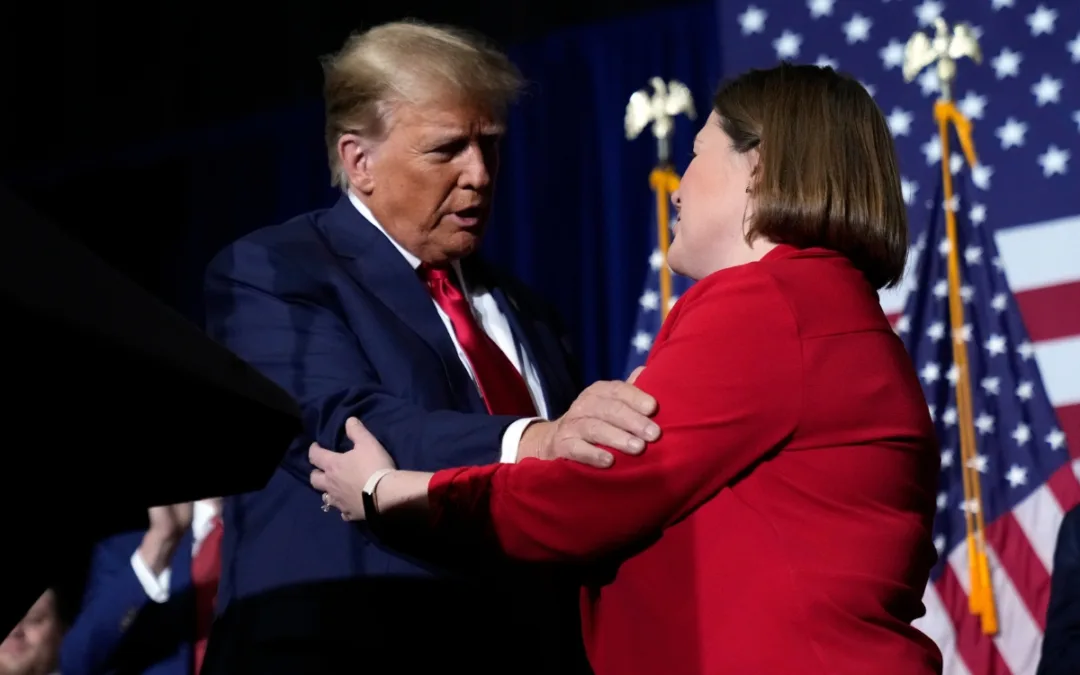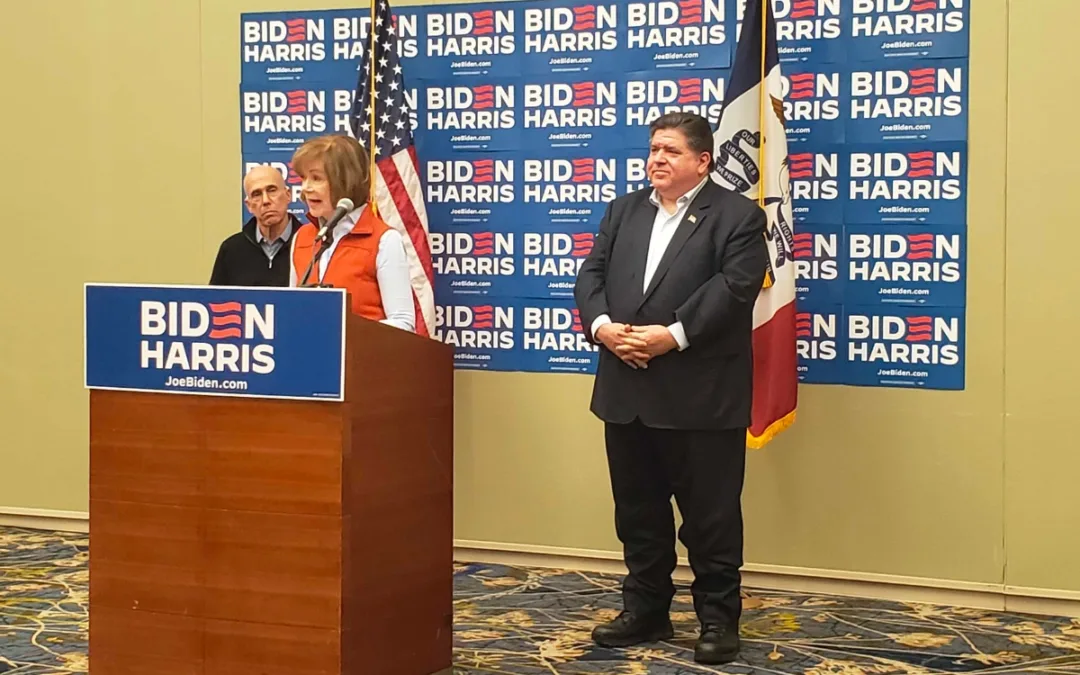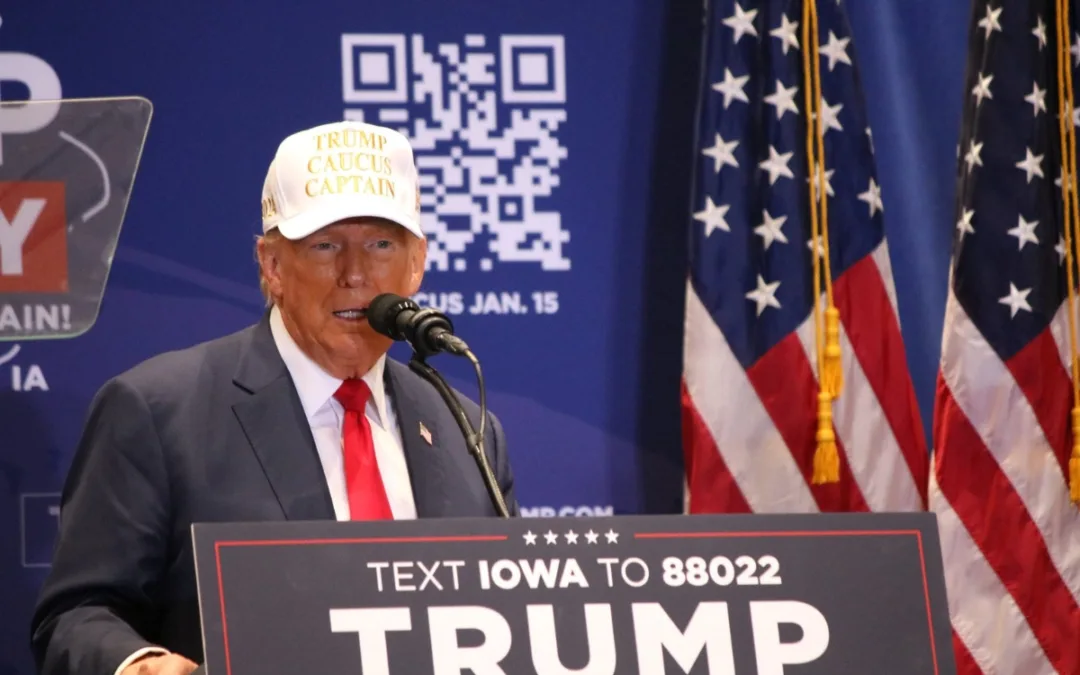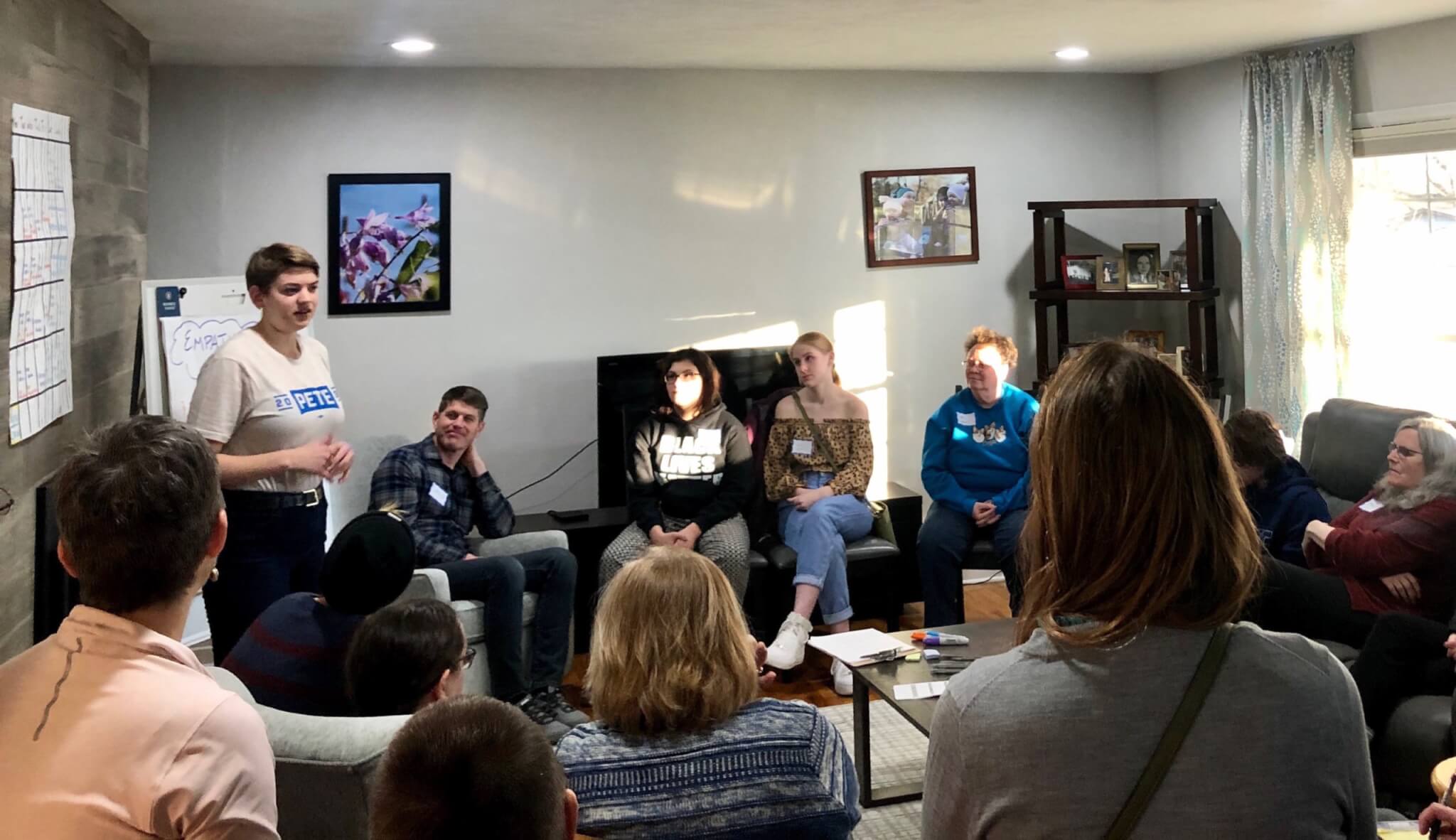
Tucked away in the bright front room of an Iowa City ranch home on a recent Sunday afternoon, Pete Buttigieg field organizer Ruby Goldberg seamlessly demonstrated a mock door-knocking simulation and casually rambled off persuasive canvassing skills at the precinct’s last field meeting before caucus day.
“I thought that was a really good example of taking what she was saying and using that to build a conversation. And it was really smooth and I thought it sounded great,” one meeting attendee complimented Goldberg, after she acted out a conversation with a volunteer pretending to be an undecided voter. A group of nearly 30 Buttigieg volunteers watched on.
But Goldberg’s success as a field organizer wasn’t because she had experience in the role. In fact, Buttigieg’s campaign was the first time she’d been directly involved in presidential politics — her background is in climate activism.
Although Buttigieg’s climate plan has been criticized by some climate groups, Goldberg, along with other staff members with climate backgrounds, said the candidate’s environmental policies are distinct because of his ability to build coalitions and unify the country around the issue.
“I see myself as an organizer that’s trying to have a place I can live in 40 years. And that means for me, doing whatever I can do to raise my voice and make sure the climate crisis is addressed,” Goldberg said. “I think the opportunity that we have in 2020 is to elect a leader to the White House who can motivate the country to act around this crisis, as well as all the different areas that it intersects with.”
[inline-ad id=”3″]
Goldberg grew up in New York City and remembers when Hurricane Sandy hit while she was in high school, shutting down the NYC public school system. She points to that moment as a catalyst for her climate activism. She organized in a coal and fossil fuel divestment movement during college, then with the People’s Climate March in 2014 and later worked with indigenous communities in Ecuador to fight against coal and oil extraction.
“I still consider myself a climate organizer, I will always consider myself a climate organizer, and I think the place that I think my work is most needed right now is to elect Pete,” Goldberg said. “In my mind, what makes Pete the best candidate to tackle the climate crisis is what makes him so incredible as a candidate in general, which is he understands that as a nation we are facing historic problems, and the opportunity we have is to use this moment of crisis to mobilize all of America.”
[inline-ad id=”4″]
Buttigieg And Young Climate Activists
Goldberg’s holistic vision of addressing climate change is much different than the youth climate group Sunrise Movement, which, reflected in its endorsement of Sen. Bernie Sanders last week, has expressed interest in urgent, sweeping climate policy overhauls proposed by candidates.
Sunrise’s early support of Buttigieg quickly faded as the campaign developed. The movement, which had praised Buttigieg’s comments on a Green New Deal in March, staged a sit-in at his South Bend, Indiana, office a few months later, protesting his climate plan for the city and his national proposals.
Buttigieg also saw pushback from students at Grinnell College about his climate policies. In December, a few members of Grinnell’s Sunrise Movement chapter held up sheets with protest messages at one of his events. “Wall Street Pete,” said one — and the candidate replied, “They said the same thing about Obama.” Another said “You will kill us;” Buttigieg answered, “That’s mean. I’m here to help.”
[inline-ad id=”5″]
Compared to Sanders’ $16 trillion plan, Buttigieg’s climate plan proposes a $2 trillion investment.
Despite progressive candidates like Sanders proposing climate plans with bigger spending goals, Cedar Rapids field organizer Isabella McCann said Buttigieg’s plan was the most comprehensive approach to tackling the crisis.
Buttigieg’s plan “builds coalitions across the country in urban and rural areas,” while aiming for a zero-emissions electricity system by 2035, and the creation of more than 3 million high-paying clean energy jobs over the next decade.
“He just kind of weaves this sense of belonging into everything he does when it comes to climate change, which is so creative and unique, and he ties it into this larger sense of national identity,” McCann said.
[inline-ad id=”0″]
As a recent college graduate, McCann led a fossil fuel divestment campaign for four years at her college, organized and led trainings for New England divestment conferences, led actions, including rallies and sit-ins, around climate issues such as the Dakota Access Pipeline and organized Maine’s participation in nationwide actions such as Our Generation Our Choice.
But McCann was also part of a national divestment network that eventually became the Sunrise Movement. She said she was a junior in college when the group first began, and she was “involved in the initial aspects of the movement — what the structure would be, what it would look like across the county.”
McCann was drawn to Buttigieg because of his youth, that he’d have a stake in the crisis. She stuck with the team because of his message of unity, which she said was a vital aspect of fighting climate change.
[inline-ad id=”1″]
Though she’s attended some Sunrise meetings in Cedar Rapids, at Iowa’s most active hub, McCann said she sees being part of Buttigieg’s campaign as still being a climate organizer.
“The values that I care deeply about are reflected in his campaign, so I don’t see them as two separate things. I think what I’m doing right now is organizing for climate change,” she said.
Attracting Farmers Across The Political Spectrum
While his climate policies haven’t gathered the support of swaths of young people, he’s seen success with other groups, like farmers.
Toby Cain, the regional political director who oversees rural and agricultural outreach for Buttigieg’s campaign in Iowa, said they often hold small listening sessions in rural communities, where one of the most frequent issues brought up is climate change, and the ability of farmers in rural communities to support themselves.
“I’m hearing a lot of farmers and folks on the ground worried about the impacts of climate change,” Cain said. “When I travel to rural communities, and especially when Pete is traveling to rural communities and speaking at town halls, he almost always gets a question about climate. And he oftentimes links it back to those agricultural communities, and how those communities are part of the solution.”
[inline-ad id=”2″]
Cain became interested in sustainable agriculture when she finished her undergraduate degree at Grinnell, and said she’s since “dedicated her career to the intersection of climate and agriculture.”
That has meant getting an advanced degree in sustainable agriculture systems and lobbying for the National Farmer’s Union and the National Young Farmers Coalition.
The difference between choosing Buttigieg as her candidate and someone like Sanders is the former mayor’s ability to bring people together.
“Climate change is one of those issues that we are going to have to be absolutely united on to tackle. I think Pete has the demeanor, intelligence and approach to bring a broad spectrum of folks together to get things done,” Cain said.
[signup_form]
In campaign work in rural areas, Cain said Buttigieg’s message is resonating with people across the political spectrum.
“It’s a diverse coalition of folks who are drawn to his message, but because all farmers, no matter if they’re democrat or republican, have a huge sense of pride in their land and they steward that land,” she said. “Climate change is the biggest issue facing our time, and I know that he has the coalition-building skills to act.”
By Isabella Murray
Posted 1/14/2020
Politics
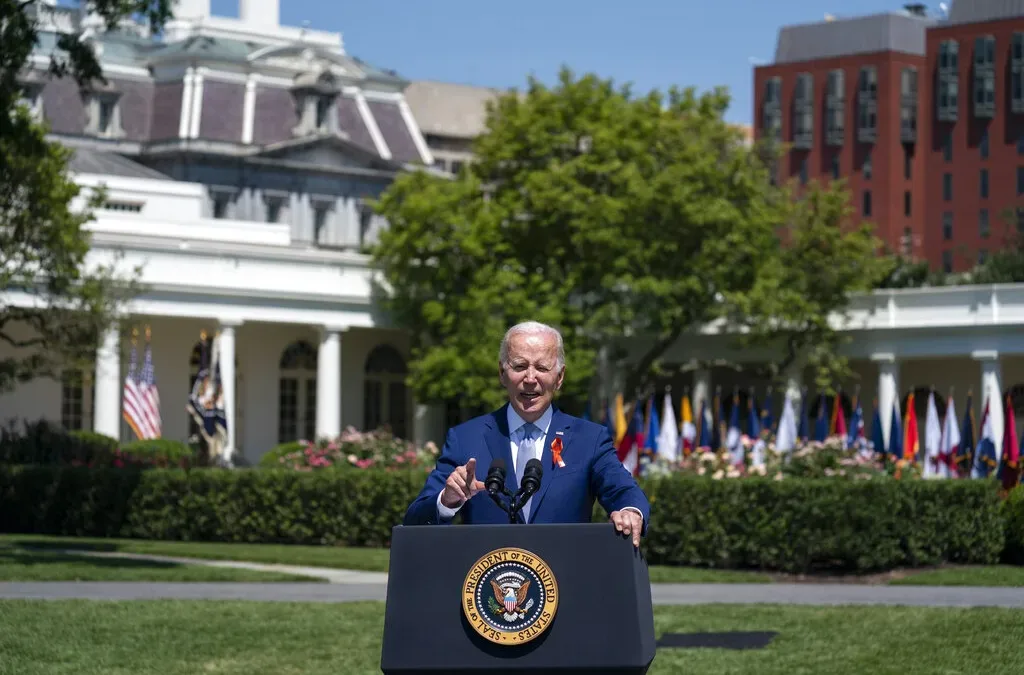
Biden announces new action to address gun sale loopholes
The Biden administration on Thursday announced new action to crack down on the sale of firearms without background checks and prevent the illegal...
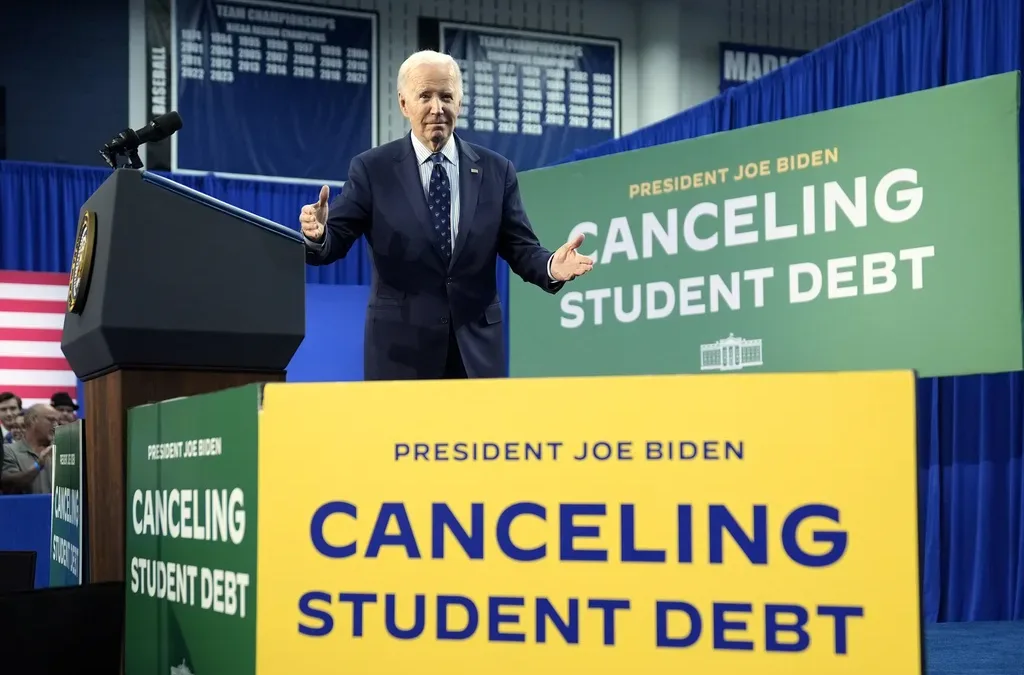
Biden cancels student loan debt for 2,690 more Iowans
The Biden administration on Friday announced its cancellation of an additional $7.4 billion in student debt for 277,000 borrowers, including 2,690...
Local News

No more Kum & Go? New owner Maverik of Utah retiring famous brand
Will Kum & Go have come and gone by next year? One new report claims that's the plan by the store's new owners. The Iowa-based convenience store...

Here’s a recap of the biggest headlines Iowa celebs made In 2023
For these famous Iowans, 2023 was a year of controversy, career highlights, and full-circle moments. Here’s how 2023 went for the following Iowans:...


